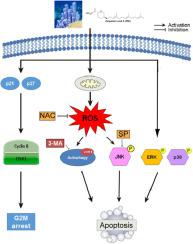Phytomedicine ( IF 6.7 ) Pub Date : 2021-08-17 , DOI: 10.1016/j.phymed.2021.153720 Shih-Ya Hung, Wu-Fu Chen, Yi-Chen Lee, Jui-Hsin Su, Yung-Shun Juan, In-Pin Lin, Ya-Hui Zhang, Ming-Kai Chang, Mei-Ying Lin, Chung-Yi Chen, Chien-Hsing Lee

|
Background
Bladder cancer (BC) is a very common type of malignant cancer in men and new therapeutic strategies are urgently needed to reduce mortality. Several studies have demonstrated that Rhopaloic acid A (RA), a compound isolated from marine sponges, fights cancer but its potential anti-tumor effect on BC is still unknown.
Purpose
The present study was aimed to explore the potential anti-tumor effects of RA against human BC cells and the underlying molecular mechanism.
Methods
Cell cytotoxicity was determined using the MTT and colony formation assays. Cell cycle distribution, apoptosis induction and generation of mitochondrial reactive oxygen species (ROS) were analyzed by flow cytometry. Mitochondrial membrane potential, acridine orange staining and intracellular ROS levels were observed using fluorescence microscopy. Levels of various signaling proteins were assessed using Western blotting. Furthermore, a zebrafish BC xenotransplantation model was used to confirm the anti-tumor effect of RA in vivo.
Results
Treatment with RA significantly suppressed the proliferation of BC cells that resulted from G2/M cycle arrest. Additionally, RA induced mitochondrial-mediated apoptosis and autophagy in BC cells. The death of BC cells induced by RA was rescued by treatment with inhibitors of apoptosis (Z-VAD-FMA) or autophagy (3-MA). RA activated the MAPK pathway and increased the production of cellular and mitochondrial ROS. Treatment with the ROS scavenger N-acetyl cysteine, effectively reversed the induction of apoptosis, autophagy, JNK activation and DNA damage elicited by RA. Finally, RA significantly inhibited tumor growth in a zebrafish BC xenotransplantation model.
Conclusion
Taken together, our findings indicate that RA induces apoptosis and autophagy and activates the MAPK pathway through ROS-mediated signaling in human BC cells. This RA-induced pathway offers insights into the molecular mechanism of its antitumor effect and shows that RA is a promising candidate for the treatment of BC.
中文翻译:

Rhopaloic acid A 通过 ROS 介导的信号传导在膀胱癌中诱导细胞凋亡、自噬和 MAPK 激活
背景
膀胱癌 (BC) 是男性中一种非常常见的恶性肿瘤,迫切需要新的治疗策略来降低死亡率。几项研究表明,从海海绵中分离的化合物 Rhopaloic acid A (RA) 可以抗癌,但其对 BC 的潜在抗肿瘤作用仍然未知。
目的
本研究旨在探讨 RA 对人 BC 细胞的潜在抗肿瘤作用及其潜在的分子机制。
方法
使用 MTT 和集落形成试验测定细胞毒性。通过流式细胞术分析细胞周期分布、细胞凋亡诱导和线粒体活性氧(ROS)的产生。使用荧光显微镜观察线粒体膜电位、吖啶橙染色和细胞内 ROS 水平。使用蛋白质印迹评估各种信号蛋白的水平。此外,斑马鱼 BC 异种移植模型用于确认 RA在体内的抗肿瘤作用。
结果
用 RA 治疗显着抑制了由 G2/M 周期停滞引起的 BC 细胞的增殖。此外,RA 在 BC 细胞中诱导线粒体介导的细胞凋亡和自噬。通过用细胞凋亡抑制剂 (Z-VAD-FMA) 或自噬 (3-MA) 处理来挽救 RA 诱导的 BC 细胞死亡。RA 激活 MAPK 通路并增加细胞和线粒体 ROS 的产生。用 ROS 清除剂 N-乙酰半胱氨酸处理,有效地逆转了由 RA 引起的细胞凋亡、自噬、JNK 激活和 DNA 损伤的诱导。最后,RA 显着抑制斑马鱼 BC 异种移植模型中的肿瘤生长。
结论
总之,我们的研究结果表明 RA 诱导细胞凋亡和自噬,并通过 ROS 介导的人 BC 细胞信号激活 MAPK 途径。这种 RA 诱导的途径提供了对其抗肿瘤作用的分子机制的见解,并表明 RA 是治疗 BC 的有希望的候选者。











































 京公网安备 11010802027423号
京公网安备 11010802027423号